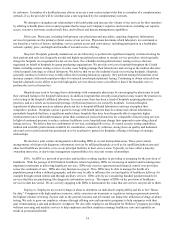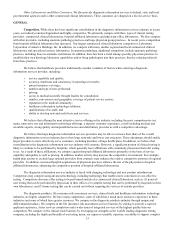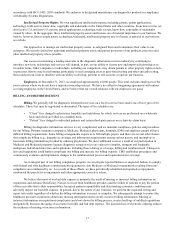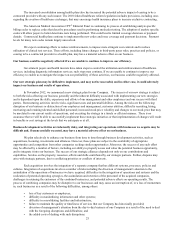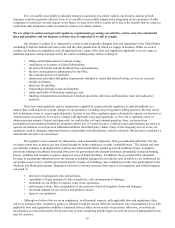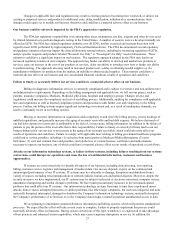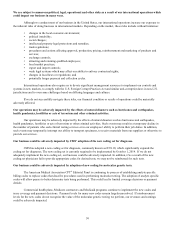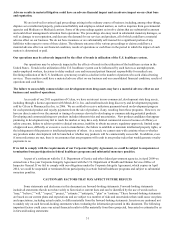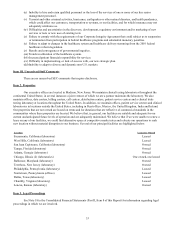Quest Diagnostics 2013 Annual Report Download - page 28
Download and view the complete annual report
Please find page 28 of the 2013 Quest Diagnostics annual report below. You can navigate through the pages in the report by either clicking on the pages listed below, or by using the keyword search tool below to find specific information within the annual report.24
Government payers, such as Medicare and Medicaid, have taken steps to control the utilization and reimbursement of
healthcare services, including clinical testing services.
We face efforts by government payers to reduce utilization and reimbursement for diagnostic information services.
From time to time, Congress has legislated reductions in, or frozen updates to, the Medicare Clinical Laboratory Fee
Schedule. In addition, CMS has adopted policies limiting or excluding coverage for clinical tests that we perform. We also
provide physician services which are reimbursed by Medicare under a physician fee schedule, which is subject to adjustment on
an annual basis. Medicaid reimbursement varies by state and is subject to administrative and billing requirements and budget
pressures. The 2010 federal healthcare reform legislation includes further provisions that are designed to control utilization and
payment levels.
In addition, over the last several years, the federal government has continued to expand its contracts with private
health insurance plans for Medicare beneficiaries, called “Medicare Advantage” programs, and has encouraged such
beneficiaries to switch from the traditional programs to the private programs. There has been continued growth of health
insurance plans offering Medicare Advantage programs, and of beneficiary enrollment in these programs. Also in recent years,
states have mandated that Medicaid beneficiaries enroll in private managed care arrangements. Recently, state budget pressures
have encouraged states to consider several courses of action that may impact our business, such as delaying payments, reducing
reimbursement, restricting coverage eligibility, service coverage restrictions and imposing taxes on our services.
From time to time, the federal government has considered whether competitive bidding can be used to provide clinical
testing services for Medicare beneficiaries at attractive rates while maintaining quality and access to care. If competitive
bidding were implemented on a regional or national basis for clinical testing, it could materially adversely affect us. Congress
periodically considers cost-saving initiatives as part of its deficit reduction discussions. These initiatives have included
coinsurance for clinical laboratory services, co-payments for clinical laboratory testing and further laboratory fee schedule
reductions. If any of these initiatives were implemented, it could materially affect us.
In 2014, CMS will begin a five-year review of 1,250 codes on the Medicare Clinical Laboratory Fee Schedule to
adjust payment beginning in January 2015 to reflect technological changes that have occurred since the Clinical Laboratory Fee
Schedule was implemented.
The American Medical Association CPT® Editorial Panel is continuing its process of establishing analyte specific
billing codes to replace codes that describe procedures used in performing molecular testing. The adoption of analyte specific
codes will allow payers to better determine tests being performed. This could lead to limited coverage decisions or payment
denials. Medicare contractors and Medicaid programs continue to implement the new codes and issue coverage and payment
decisions. Payment levels for many new codes remain largely unresolved.
We expect efforts to reduce reimbursements, to impose more stringent cost controls and to reduce utilization of
clinical test services will continue. These efforts, including changes in law or regulations, may have a material adverse impact
on our business.
Third parties, including health plans, have taken steps to control the utilization and reimbursement of health services,
including clinical testing services.
We also face efforts by non-governmental third-party payers, including health plans, to reduce utilization and
reimbursement for clinical testing services. For example, in light of health care reform, there is increased market activity
regarding alternative payment models, including bundled payment models.
The healthcare industry has experienced a trend of consolidation among health insurance plans, resulting in fewer but
larger insurance plans with significant bargaining power to negotiate fee arrangements with healthcare providers, including
clinical testing providers. These health plans, and independent physician associations, may demand that clinical testing
providers accept discounted fee structures or assume all or a portion of the financial risk associated with providing testing
services to their members through capitated payment arrangements. In addition, some health plans have been willing to limit
the PPO or POS laboratory network to only a single national laboratory to obtain improved fee-for-service pricing. Some
health plans also are considering steps such as requiring preauthorization of testing. There are also an increasing number of
patients enrolling in consumer driven products and high deductible plans that involve greater patient cost-sharing.


